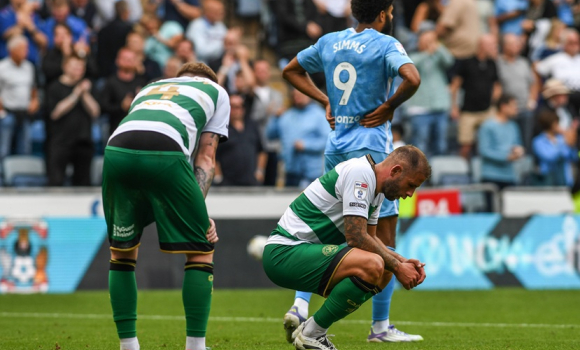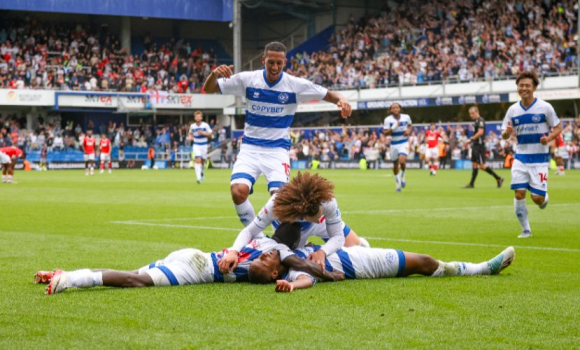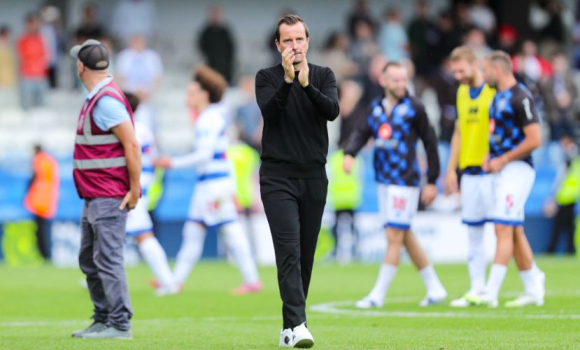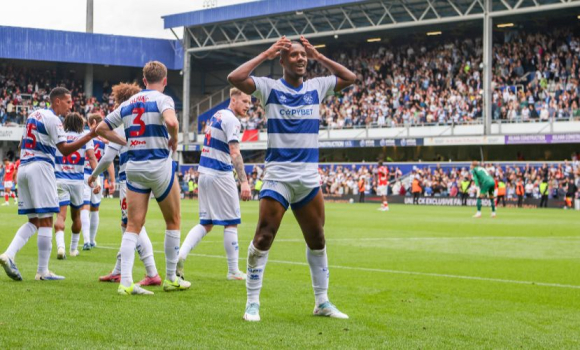Julien Stéphan talks dreams, transfers, and that Coventry game – Interview Thursday, 11th Sep 2025 07:19 by Clive Whittingham QPR’s new head coach Julien Stéphan sits down with LFW to discuss his first few weeks in the job, the transfer window, an August of fluctuating emotions and form, and his aims and goals for the season. You can listen to the audio of this interview over on our Patreon. We’d obviously love you to take out a subscription if you haven’t already to support the work of this site and allow us to continue bringing it to you, but on this occasion we’re making the interview available free of charge to all. I was really interested by your previous record in France and why you would come to QPR. What was the attraction of the job in the first place? After five or six years coaching in France I wanted to discover something new. A new culture, a new league, a new environment, a new language. This was a good opportunity for me at the right moment. When the opportunity arose I decided to come here because I think it's a good project. I liked the way the management presented the project to me and the different discussions that we had together, and the different personalities also, because I had discussions with, of course, the CEO, with the owners, but also with the performance staff and with the other staff members. So yes, I was convinced that it was a good project for me. It's a tough gig, because we're in a league where you have a team like Southampton who come down with £150m, they sell £100m of players, they have a 30,000 seater stadium, and there are a few clubs like that. We're not in that position. So, a tough job to take on. It's the same thing in France and other countries as well. Three or four years ago I worked in Strasbourg and in the first year we invested only, I think, £3m, then the second year, not a penny. So, it’s not only in England, it's in all countries. For me, when you have difficulties it's an opportunity to do things differently from other clubs. I wouldn’t say we don’t have money, but we do probably have less money than many other clubs, so we need to work differently. I’m very happy to work with the staff here, because for me we have a top, top staff across the technical staff, the performance staff, the medical and the management. It’s nice to work with them every day and most importantly for me is working with confidence and with trust in each other. This is the most important thing for me. It’s more important than money. While you were in France, you had a good record of developing young players. I think this was something that the club were keen to stress when you were appointed in the summer. Obviously, it helps when they're as good and as talented as Ousmane Dembele and Jérémy Doku and people like that. But for you, what are the key aspects around developing young talent? The first key is the talent of the young player. This is the first key, because if you don't have enough talent in young players, it's difficult to develop them. So, first of all, it’s to see if we have enough talent, then after that you have to have trust in them every day. When you want to develop young players you need to accept that sometimes they will make mistakes. If you don't accept that it's very difficult to develop the young players, because you have to continue to trust in them, even if they do make mistakes, and even if it's not perfect at the beginning. After that, you need to always be asking when is the right moment to put them on the pitch? Is it the right moment? Is it a good moment for them? I know with my experience that if you put the player on the pitch too early it could make it very difficult for them if they don't succeed. It's not only my job. It's the job of all the people around the club to work with them and to support them every time. You had good success very early at Rennes as a first team coach – a cup win, Champions League and European football. You've had some time out since you were with Strasbourg and Rennes the second time which was a tougher spell. What lessons do you think that you took from those jobs? A lot, a lot of lessons. Probably most of all that if the context is not good it’s very difficult to have good results. So, the first thing is the context. It's not the only thing, but the first thing is the context. When you have a good context, it's easier. It's not easy, but it's easier to have good results. If the context is not very good, it's very hard to have good results. I’ve known since the beginning that this job has a lot of ups and downs. It’s the same thing in this league, the Championship, we will have a lot of ups and downs in a season and I think it's important to stay stable - to stay emotionally stable. When you win, stay stable because you did some good things, but you have always some corrections. If you lose a game, stay stable, because the players need confidence after a loss. Say you need to correct some things, but stay stable. For example, after Coventry, we lost 7-1 - it was the first time in my career. I think we did well, not just me but all the people here, the week before Charlton. All the people here stayed stable emotionally. It meant the players understood that it was unacceptable as a result of course, but it’s not the end of the season. It was a shock, and we had to react quickly, but we had to react in the right way. And when I saw the first 15 or 20 minutes against Charlton I understood what I was sure about before the game - that the reaction of all the people here to that result was perfect. To be honest, we won the game against Charlton in the week before with all the people and the players. They understood they needed to react, of course, but they understood as well that we need to stay stable emotionally each time we have a setback.
I was going to come to Coventry a little bit later, but you brought it up, so let's get it out of the way. What particularly went wrong at Coventry for us? We lost a lot of duels in that game, especially in the first half. And when you lose a lot of duels, it's impossible to play football - in France, in England, Germany, in Italy, impossible. It's not a question of 442, 433, 4231, 352, it's not a tactical question. If you don't win the duels, you lose the game. It's not a question of game model after that, no, win the duel, and we lost a lot of duels, especially in the first half. When you look at the statistics at the end of the game it was only an xG of around one and yet we conceded seven goals. I think in the history of the statistic it was the first time that’s happened. We can explain a lot of things, but it is difficult to explain why we conceded seven times against Coventry. Two, three, four… but seven was very difficult to explain. For me, it was not tactical. It was more a question of duels and also the mindset, because after the third goal the mindset was not enough good. After that, you need not just a reaction but a strong reaction. And against Charlton it was a strong reaction. I hope it's only one crash in the season, and the first one is the last one. What else changed between Coventry and Charlton? Approach wise and tactics wise? Because it looked to me in the Charlton game that we went much more direct up to Richard. Of course. I said straight after the Coventry game that I promise one thing: we'll see a completely different team against Charlton. Yes, we played more direct and we played also in a different structure – it was 4411/442 against Charlton. I think in the Championship if you are not able to adapt your strategy it's very difficult to win. I continue to learn about the Championship each game. I’m trying, and my staff members are trying, to learn quickly, but we understood that we needed to change something against Charlton and we did. Each game, of course, we will have some different ideas. We have our principle of play, and the principle of play is not negotiable. It's non-negotiable, okay, but adaptation is also important. We adapted with a more direct approach against Charlton. So yeah, we changed something, because we needed to.
It worked, and we looked a much sort of happier, more solid team in the Charlton game I thought. So, is it a permanent adaptation? Well, if I say permanent that will mean it’s always going to be the same thing, and that’s not the case. It's always little details. Little details, because when you are manager and when you work with a staff member, our reflection is always the profile of our players, adaptation to the profile of our players, and to the opponent. You have to adapt to the profile of your players and a little adaptation also with the opponents. We always have to deal with these two questions. There's a lot of talk about this concept of a game model. The club wants to play the same way through every age group into the first team. How much flexibility do you have, as the head coach, to be able to say, right, we're going to go direct up to Richard today, we're not going to play the goal kick routine? When you talk about game model, what exactly is the definition of game model? You will have a definition, I will have a definition, somebody else will have a definition. For me it’s more a question of principles of play, mindset and values. Okay, you want to build each time from the goalkeeper. Barca, they can do that. Are we able to do that all the time? I don't think so. I don't think so. So that's why I spoke just before – it’s always a question of adaptation. I've just seen yesterday that Thomas Tuchel, now with the national team, saying at the next World Cup we will have probably more long throw-ins and more direct play with the goalkeeper. IMAGINE, Thomas Tuchel, who played at PSG or Chelsea always with short connections, now saying we need to adapt because football changes every time. Now, not all the teams but most of the teams use one against one in a high press. Okay, that means you have your goalkeeper free. This is another player, the 11th player on the pitch, but defensively teams are now able to organise a press that also presses the goalkeeper. That means you need to find all the solutions - not only the short solution, but a mid-range solution and a long one where you organise and compete for the second ball. It’s not kick and rush. It's just adaptation. It's not only 442, 433. Against Preston we started in 433, against Charton it was 442, but it was also a different way to play against Charlton and against Preston. So, it's more question of principle of play, mindset, values and then adaptation.
Football does seem to be going that way to me, like you said, Thomas Tuchel saying that and the big thing for me when we played Brentford in pre-season was the size of them. I couldn't believe the size of their team physically, and it was all set pieces and throws. Has football moved away from that Pep Guardiola, Barcelona style of a few years ago? That's why I said just before that - football moves very, very quickly. Very, very quickly. And sometimes you can have an exception, like, for example, Pep’s team. But the definition of an exception is it’s not common. In the Premier League you have a lot of teams with tall players, strong players, powerful players, but also technically able to use the ball. That means you need to be able to do all the different things on the pitch, not only tiki taka. It's probably two or three teams in the world who can do just that, but for the other teams it's a different way. And that's why football is fantastic, because you can win with a different way. There is not a good way and a bad way. It's just a way, an adaptation with the profile of your players and with your ideas. It has been a difficult start. Thank goodness the last result was good against Charlton, but we have had a difficult August. Is there anything that you've been surprised about versus your first couple of weeks here, what you thought you had versus what you think you've got now? It’s the same for all clubs, managers and coaches – you finish the transfer window at the end of August. You only know exactly what squad you have at the beginning of September. I don't want to say that you start your season in September, but you only have your full squad with all the players available for you for the season on September 1. So, okay, August, four games, we won one, one draw, two defeats. We now have 42 games with all the players. I know now exactly which players will play for QPR this season, but I’ve only known that for one week. Of course I’d prefer to have started winning the first four games, of course I would. But sometimes you need to deal with and to accept the situation. Now I know exactly, and we can work with all the players for the season ahead. How was that transfer window for you? What do you think of the business that we've done? And how much input do you have personally into the players that we sign, or is that done by the people above you and you’re just the head coach? My role is very clear and very simple. I spoke during the transfer window every day with the recruitment department, with the CEO, and we spoke every day about the profile of players. We have the profile, and then we have the budget. The budget is not for me. We try to do our best with our budget. I try to be clear with the profile. Okay, I'd like to have this kind of player in this position with these particular attributes. After that the management, the owners, they try to do their best with our budget. So it's very simple and very clear. All the players who sign here I always have a meeting with them to present how we want to play, how we want to develop them in the squad, and to explain to them how we want to use them on the pitch. After that, if it's okay with the budget, we can sign them. If it's not okay with the budget, we try to find another player with the same profile. It's easy.
In the Preston game, I thought we were very good in the first half, and then we couldn't follow through really in the second half, which was a shame. Against Watford, obviously, first half bit of a nightmare, start the second half really well, and then didn't have enough to push home for the equaliser at the end there. Why are we at the moment only able to do, I think you've said 45-60 minute performances, not a 90-minute performance. Is that a fitness issue? No, I don't think so. You know, it's always the same thing in all countries and with many clubs. For me, it's impossible in the first three or four games to do a full 90 minutes. Preston, we were dominant in the first half, and they were better the second half, but they didn't have a lot of opportunities. So Preston, they didn't do 90 minutes. Against Watford they were dominant the first 45 minutes, we were dominant the last 45 minutes. So, after that it’s just a question of results. If we scored a second goal against Watford, and we had different opportunities to do that, probably the interpretation of people could be different, completely different. It's always a question of results. Against Charlton, collectively, I thought it was a good game. The first 20 minutes amazing, but we won and we scored the winning goals ten minutes before the end of the game. In my mind, even if we didn't score, I thought we played well and can continue like this. Actually, we scored two times in the last ten minutes. Imagine, if we were not good about the fitness, how is it possible to score two goals in the last ten minutes? So, it's not a question of fitness it is just a question of how you deal with the different momentum, especially at the beginning of the season. The first four or five games, it's always a question of momentum, because you don't find any team able to control the game for 90 minutes at the beginning of the league, it's impossible. Even in the middle it’s very difficult to control a full 90 minutes, unless you’re two or three teams like PSG in France, Man City here, not last season but the season before, it's an exception. So it’s how you deal with the momentum, and how you’re able to be efficient when you have the opportunity to score. We didn't do that against Preston, because in the second half the best situation for us, with Kaddy Dembele, produced a great save from the goalkeeper. Without this save, it's 2-1, and probably the interpretation of our second half performance is completely different. Against Watford in the second half we had many opportunities to score the second goal. We didn't do that, so it's our fault, but if we score the second time, the interpretation is completely different with the same game, the same players, the same manager, the same structure, the same principle of play. That's why sometimes you need to stay only focus on the way you want the team to play and not only the results. I know the result is very important, but stay focused on how you want to play, because I think in the long term you will win. You did beat PSG, very famously in a cup final, your cup record is very, very good. This club's cup record is very, very bad. I'm sure people have told you our history and cups, and we were winning our most recent cup tie 2-0 at halftime, and we lost. I think a few supporters were disappointed about that. Can you explain the approach to that Plymouth game that we took and why we did that? Yeah, it's very simple. We took a decision, it's always my decision at the end, but we speak together about different things and before Plymouth we decided, and I took the decision at the end, that it was probably the opportunity for the young players to show their qualities against Plymouth in the League Cup. Okay, we took this decision. Half time 2-0 up. I'm not sure the question at the end of the game would have been the same at half time. We wanted to see all the players on the pitch against Plymouth, and I think after 45 minutes we were doing very well against a side that had a lot of experience. It was also for us an opportunity to put them in a real condition of competition, because it's completely different to see them on the pitch during the week and to see them in competition. If we want to determine very precisely the strengths and the weaknesses of the different players, and especially the young players, we need to put them in situations. So, we decided to play with the young players against Plymouth. What are your expectations, aims and goals for this season? We want to improve and be more consistent than we have been in the last few years. I think over the last three seasons we’ve finished 20th, 18th and 15th. If we can be more consistent we will have a better ranking at the end of the season. This is our main goal, to improve. Another goal is to win more points at home. For me, it's important because we have fantastic fans, and when we play at home we play with and for the fans. With and for, with because they push us to give not only 100% but 110%, and for them because we want to share emotion with them. At the end of the game against Charlton, when you win a game like this in the last ten minutes, and I’m on the bench, I turn to the side and see the face of the fans, sometimes they are crazy, but it’s so beautiful to see that. This is part of my job, I do this job to share those kind of moments. It was fantastic for me to see that. So, this season I would really like to win more points at home compared to last season. Can you sell it to those supporters? We’ve been in this division for ten years, it’s a lot of games against Preston. Football is about emotion as you say. I don’t think there is a support base that knows about FFP in greater detail than the QPR fans, we completely get it, but football and sport is about dreaming and ten years is a long time in the Championship. It’s an increasingly difficult sell to those supporters that our main aim at the moment is to sell any good player we get to somebody else so we can improve our financial position. That’s modern football, but it’s a difficult sell. Allow us to dream, where do you think this club can go other than the middle of the Championship and selling players? You know ‘dream’ and ‘manager’ are very different things. Okay, let me be a dreamer for just 30 seconds. As a dreamer I’d like to work with the same squad of players two or three years in a row, because I think it’s very difficult to build anything strong in only one year. If you work with 90% of the same squad across two-three years - three years for me is the perfect time - and if you add just one or two players each window, not more, just to complete your puzzle, this is the dream because you can build something. I’m not sure it’s possible, but if you ask what is my dream, this is it. If you enjoy LoftforWords, please consider supporting the site through a subscription to our Patreon or tip us via our PayPal account loftforwords@yahoo.co.uk. Pictures - Ian Randall Photography Please report offensive, libellous or inappropriate posts by using the links provided.
You need to login in order to post your comments |
Blogs 31 bloggersDerby County Polls[ Vote here ] |
We in turn value your personal details in accordance with our Privacy Policy.



